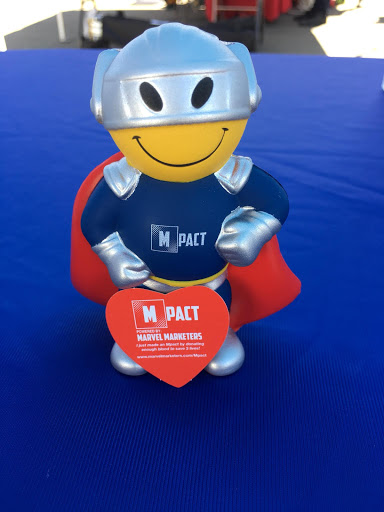It’s been three years, and you are still the Marketing Operations manager at your company. You’ve gotten good, I mean, really good at your job. Your templates are flawless, you’ve reduced turnaround time by 70%, and your database is so clean you can eat tomato soup out of it. You’re in a good place, but you’re in the same place.
Meanwhile, everyone else around you seems to be doing things. How did Josh the SDR transition to become a Customer Success Engineer? When did Wendy the intern become Head of Brand? Sam left to start his own company?! (Who took the Honolulu Cookies that I left on his desk?!)
When your job requires you to hyperfocus on the details, it can be easy to get lost in the day-to-day that you forget to focus on your own self growth.
This has been one my biggest challenges, and one I’m constantly working on. Over the past few years, I’ve picked up a few best practices to shake me out of my tunnel vision and help me refocus on my own personal and career growth.
Time management
- Block time to make time: Schedule a block of time to plan for the days/weeks ahead
- Take into account the Makers schedule model when planning:
- Concept: People in technical roles, or “Makers”, need large blocks of time to get work done while people in power are typically accustomed to expecting new meeting occurrences every hourPractice: Before others have the opportunity to break up your day with sporadically scheduled meetings, schedule yourself long blocks of time for completing tasks. Constantly protect your calendar. For meetings with ambiguous agendas, question whether your attendance is required.
- Set a monthly calendar block for personal reflection: Sit in a quiet room and reflect on things like: “Am I too comfortable?”, “Am I happy with my current role?”, “Are there any events I’d like to attend?”, “Is there a new skill I’ve been wanting to learn?”
- Delegate whenever you can: A wise man once said, “Give a man a fish and you’ll feed him for a day. Teach a man to pull his own SFDC reports, and you’ll feed him for a lifetime.” (or something like that!) Teaching others to self-serve opens up more time on your calendar to focus on the important things
Discovery

- “30/70” rule: Spend 30% of your time on things you need to do. Spend 70% on discovering new ways to do it. For example, figure out how to improve processes, look for new tools on the market, see what’s trending in MarTech, etc
- Never stop learning: We live in a world full of incredible resources. Try learning a new skill on sites like Lynda and Udemy, or challenge yourself by learning a new language on apps like Duolingo
- Make it a habit to read the news every morning
- Plan some time to travel: It can be a different country, or maybe just a neighboring town that you’ve never visited! Being in a new environment has many benefits to your self growth, such as improving your social skills, and enhancing your tolerance for uncertainty.
Learn how to market yourself

Have you ever have a great idea that you rolled out to your team, and then Jeremy ended up getting credit for it? It’s easy to get mad at Jeremy, but a lot of the responsibility lies with you on being able to market yourself adequately.
Here are some tips to help:
- Document your contributions: Update your portfolio frequently for easy annual performance review material. You can also look back and see what has (or hasn’t) changed in a year. Are things looking redundant?
- Work on your presentation skills: Get comfortable with Google Slides, Powerpoint, or Keynote. Find a topic, build a storyline, and practice presenting in front of a small audience.
- *Tip: If you’re nervous about this, try starting with a topic that is less intimidating than work-related material. Create a presentation on how to cook your favorite dish, or why your dog is better than everyone else’s dog (not my dog though)
- Build relationships with other members of the company: The more people you interact with, the more people know what you’re doing and are able to vouch for you.
- Pay attention to what the executives are saying: Our CEO recently reminded our team of why the most important person to pay attention to is the executive. She said, “Managers are responsible for making sure you do your job correctly, but executives decide on the strategy.” Imagine if your manager asked you to do something that didn’t fall in line with the executive’s vision? You can give your manager a friendly nudge about it, problem solve to find a solution that would get both the job done and fall in line with the executive vision, and save your manager’s reputation with the executive—making you a superhero!
Some of this is time-consuming work, but it will come back to reward you in the end and ensure you never get Jeremy’d again.
Find a few good mentors

Just don’t call them your mentor. It’s weird for everyone. Take them out to lunch and ask questions about their career path. You might be surprised at how your mentors wound up in their positions!
Find inspiration

Struggling to find your “calling?” Don’t feel defeated. No one is born with a passion for anything, and most people in established careers got there by chance. Ten years ago, I was a Gymboree teacher. Five years ago, I thought I wanted to do PR. Six months after that, I realized I hated writing.
Although your career journey may change directions several times, it helps to have a starting point. You can find some inspiration in the following ways:
- Try taking a personality test (such as the Myers-Briggs) and see what types of jobs are recommended for your personality type
- Try seeking a career counselor or career counseling resources online
- Attend a professional networking event and speak with like-minded individuals with different perspectives
- Join professional groups and follow conversations on the group feed
- Volunteer. This might spark inspiration in ways you didn’t expect
Stop comparing yourself to everyone else

Cliché… but true! You go on LinkedIn and read about one colleague’s promotion paired with a philosophical, “if you believe it, you can achieve it” quote, and you think they’ve got it all together. Truth is, there were likely a lot of humiliating, ugly hard lessons learned in the process that they aren’t able to share. So focus on your own journey.
Lastly, I’ll end with this—Maybe you are incredibly passionate about your current role and you have no intention of transitioning out. Your org is lucky to have you! Identify what makes you so happy at your job, and continue seeking ways they will encourage your growth at the company.
Did you enjoy this post? Leave a comment for our superheroes below.
Want to read more of our superhero-approved tips and best practices? Subscribe to our blog at the top of this page!





